
She didn’t know it at the time, but Kristin Herber’s service in a soup kitchen in Baltimore, Maryland, during the Saturday mornings of her youth prepared her for her current role at Under Armour. As senior counsel for litigation, she found that her service at the kitchen has aided her as much as over a decade’s worth of experience in private practice, and the JD that preceded it.
“I grew up in a family where public service was encouraged,” Herber says. “From a young age, my parents encouraged me to give back to the community. That’s just something that’s deep in my DNA.”
She remembers the moment those genes expressed themselves. “When I was in middle school, we started volunteering through my religious education classes at a soup kitchen in Baltimore,” Herber says. “I had such a good time interacting with the clients there, serving them food and seeing how happy and how human they were. They were just like me. They just didn’t have food.”
Two word choices in Herber’s recollection suggest that while tracing the arc of her professional career back to that moment of realization might be overly simplistic, it’s not inaccurate. In referring to the visitors at that soup kitchen as “clients,” Herber unwittingly illustrated her approach to her nascent pro bono program at Under Armour: she had a skill that could help people, and the benefactors of that skill—be it legal expertise or soup delivery—were her clients. The other word choice, “happy,” explains both how and why she does what she does.
But before delving into the how and the why, here’s the “what” of what Herber does: She is the sole litigator on a staff of just under thirty lawyers at Under Armour, Inc., the global apparel company that has upended the athletic apparel and shoe market hegemony of competitors such as Nike and Adidas with sales approaching $3.9 billion. Herber helps members of the company’s legal team think through disputes to avoid litigation, and then manage the disputes that reach litigation. In her own words, “When people aren’t playing nice anymore, I get added to the e-mail chain.”
“From a young age, my parents encouraged me to give back to the community. That’s just something that’s deep in my DNA.”
But avoiding or bringing not-nice situations to a positive resolution isn’t everything Herber does. She starts her share of e-mail chains, too. The ones that deliver some of her most profound satisfaction involve her budding pro bono program at Under Armour and bring her back to her middle school days at that soup kitchen and to her best intentions as she neared the completion of her law degree at the University of Maryland School of Law.
“When I decided to go to law school,” Herber says, “I decided to go school to serve the public interest, and my goal was to become a public interest attorney. Unfortunately, I graduated with a significant amount of debt, which is not uncommon for law students, and so I looked very carefully at the firms in Baltimore to determine which had a culture of pro bono so that I could continue to serve the public while not necessarily taking a full-time job as a public interest attorney.”
Herber took a job with a firm that had a deep history of providing pro bono service to Maryland residents and joined the firm’s pro bono committee, finding satisfaction in the opportunities to both work with partners who were excellent attorneys and also gain substantially beneficial professional experience in the work itself. Fourteen years spent taking on a wide range of pro bono cases in private practice—from assisting battered women with obtaining divorces to advising young artists on intellectual property issues—gave Herber the breadth of experience and depth of passion for her work that, she says, made her the lawyer she is today.
What kind of lawyer is she? “I’m a grateful lawyer,” she answers, “grateful for the people who have given me the opportunity to develop my skills and develop my practice so that I could get this job at Under Armour, which is a dream job for me. I’m overseeing the litigation for a global company, which is also an exciting place to work, I oversee litigation from all facets of the substantive areas of law. I’m grateful for the opportunities I’ve had that have allowed me to get here.”
Which brings us back to the second word choice that suggests that the arc of Herber’s career from soup kitchen to dream job might be the simplest, and thus the best, kind of truth: happy. Herber’s gratitude for the opportunities she seized to become the sole litigator and a pro bono leader in a global company with an actual department of “Give Back” might just come from that happiness that derives from the serendipitous confluence of joy and utility.
Herber’s pro bono experience benefited her in all of the standard ways that pro bono experience does: helping others in her community made her feel happier. It also provided, arguably, the professional catalyst in an enviable career. That catalytic quality of her pro bono experience is part of what she hopes will foster a successful pro bono culture at Under Armour.
One of her most important planned pro bono initiatives at Under Armour ties into the company’s commitment to veterans. “Under Armour is deeply committed to first responders and to veterans,” says Herber, who comes from a family with a tradition of service in the Air Force. Heber thinks it would be particularly meaningful to organize a training to assist veterans in obtaining benefits or assist them with any other legal needs they may have.
Under Armour by the Numbers
4
main product lines
20
offices worldwide
20
sports with team or individual sponsorship
22
sponsorship deals with pro soccer teams and players
26
sponsorship deals with major NCAA intercollegiate athletics programs
38
sponsorship deals with A-list athletes, including Tom Brady and Stephen Curry
11,000
employees
$280M
the value of Under Armour’s sponsorship deal with the University of California at Los Angeles
Source: Under Armour
Sharing the meaningful aspect of that work, as well as both the expected happiness and unexpected professional benefits that derive from it, comprises the crux of Herber’s challenge in implementing and fostering a culture of meaningful pro bono legal work at Under Armour. She isn’t fazed by the challenge. As a matter of fact, it could be argued whether or not she considers it a challenge at all.
“My colleagues are incredibly smart, caring, and very experienced attorneys in specific substantive areas,” Herber says. “My goal [in starting the Under Armour pro bono program] is to show them opportunities that they may not be aware of. I’m not trying to tell them what they should or shouldn’t be doing, but just let them know what’s out there—especially because many of my colleagues are not from Baltimore. They may have moved here to work at Under Armour and might not be aware of what the opportunities are in Maryland.”
If Herber is successful in that simple task—simple, but not easy, given the typical demands on the time and energy of in-house legal counsel—it’s easy to see how she will be able to develop the culture of pro bono that represents her long-term goal at the company. “I feel really thankful for the energy and desire to give back among everyone I work with. It’s one of the aspects of Under Armour that drew me to the company.”
When Kristin Herber harnesses Under Armour’s corporate energy around her own personal and professional experience in pro bono work, she’ll have good company as one of many grateful lawyers.


